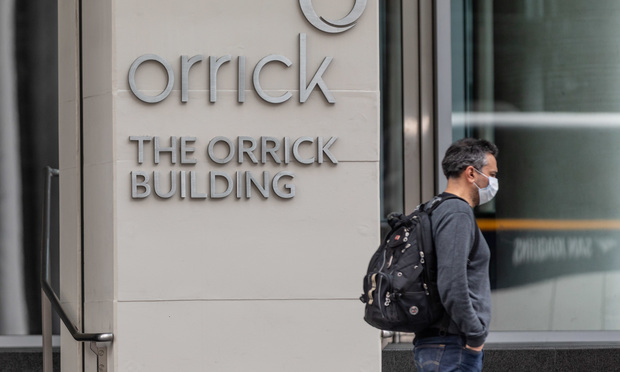3 Questions Employers Are Asking Lawyers About Reopening in the Virus Era
The client demand for fast, accurate information in a time of immense change and uncertainty is unending, management-side labor and employment lawyers tell ALM. Here are three areas clients have a lot of questions about.
May 22, 2020 at 07:26 PM
4 minute read
 Outside Orrick's San Francisco office on March 17, 2020, a day after the shelter in place order affecting almost 7 million Bay Area residents. (Photo: Jason Doiy/ALM)
Outside Orrick's San Francisco office on March 17, 2020, a day after the shelter in place order affecting almost 7 million Bay Area residents. (Photo: Jason Doiy/ALM)
Being an employment lawyer during the COVID-19 pandemic has been a 24/7 job filled with emails, calls, client alerts, guidance and policy drafts, webinars, blog updates, podcasts and almost constant refreshing of government regulators' web pages.
Clients' thirst for fast, accurate information in a time of immense change and uncertainty is unending, those in the practice report.

"Sometimes we're literally reading the new regs as they're coming out," said Sue Stott, a partner in Perkins Coie's labor and employment law practice in San Francisco.
The Recorder talked to three employment law experts to find out what companies are asking as they prepare to reopen their doors after months of physical closures. Many employers' questions have been industry- or location-specific. Is it safe for my workers to travel? How do I handle disruptions in my supply chain? What should our policy on masks be?
There were some common themes among the questions, however. Here are a few the lawyers mentioned.
What is everybody else doing?
Company leaders have a lot of questions about when—or whether—competitors or others in the industry are reopening.
The answer, lawyers say, often depends on where that company is located, whether they've been deemed "essential" and whether employees are getting the work done at home.
"In Texas, for example, we've already helped some clients return to the workplace this week," said Julie Totten, leader of Orrick, Herrington & Sutcliffe's employment law and litigation practice group. "In California, offices in different cities are each handling that differently."
That information isn't always easily available, with people working out of the office and the constant churn of changes.
"There were weeks where it seemed every day we were advising on working from home, furloughs and finally, layoffs," Stott said.
How do we prepare the workplace for employees to return?

"We're talking a lot about workplace redesign—physical plant issues, using directional signage so people are not crossing each other's paths in hallways, where to stand and where to go. Ventilation is another issue, as is cleaning and sanitizing," said Kate Gold, a partner in Proskauer Rose's labor and employment law department in Los Angeles.
Of course, answering that question also requires a handle on ever-changing rules and guidance from the Centers for Disease Control and Prevention, the Occupational Safety and Health Administration, labor regulators and state and local health officials. And lawyers have to advise clients on the difference between orders and recommendations.
California, for instance, has five "must dos" for facilities looking to reopen: create a site-specific protection plan; train employees on COVID-19 safety; implement control measures and screenings; create disinfection protocols; and set physical distancing guidelines.
"We recommend that [clients] follow the most restrictive rules and guidance," Totten said.
Can we scan employees' temperatures? Can we track and trace our workers' exposure to COVID-19?
The U.S. Equal Employment Opportunity Commission allows employers to take workers' temperatures during the COVID-19 pandemic. But "it's not as logistically simple as you may think," Gold said.
Employers have to be careful to limit who collects and sees employees' health information, lawyers said. Apps add a new dimension of privacy concerns. Then there's the issue of tracking the contacts of workers who show symptoms or test positive for COVID-19.

Voluntary contact tracing is probably OK, Totten said, but mandatory tracking needs a much closer legal examination that implicates the American with Disabilities Act, the Health Insurance Portability and Accountability Act and the California Consumer Privacy Act.
"You really need to understand what is happening with that data," Totten said. "We think the employer should probably not be the direct recipient of that data."
Stott agreed that employer-based track-and-tracing "is a brave new world."
"It should be done by professionals," she said. "The professionals, at least the ones we've seen, are government agencies that might engage professional consultants. But it's probably not something companies should engage in on their own."
This content has been archived. It is available through our partners, LexisNexis® and Bloomberg Law.
To view this content, please continue to their sites.
Not a Lexis Subscriber?
Subscribe Now
Not a Bloomberg Law Subscriber?
Subscribe Now
NOT FOR REPRINT
© 2025 ALM Global, LLC, All Rights Reserved. Request academic re-use from www.copyright.com. All other uses, submit a request to [email protected]. For more information visit Asset & Logo Licensing.
You Might Like
View All



Nevada Supreme Court Rejects Uber-Backed Ballot Initiative for 20% Fee Cap
4 minute readTrending Stories
- 1Gunderson Dettmer Opens Atlanta Office With 3 Partners From Morris Manning
- 2Decision of the Day: Court Holds Accident with Post Driver Was 'Bizarre Occurrence,' Dismisses Action Brought Under Labor Law §240
- 3Judge Recommends Disbarment for Attorney Who Plotted to Hack Judge's Email, Phone
- 4Two Wilkinson Stekloff Associates Among Victims of DC Plane Crash
- 5Two More Victims Alleged in New Sean Combs Sex Trafficking Indictment
Who Got The Work
J. Brugh Lower of Gibbons has entered an appearance for industrial equipment supplier Devco Corporation in a pending trademark infringement lawsuit. The suit, accusing the defendant of selling knock-off Graco products, was filed Dec. 18 in New Jersey District Court by Rivkin Radler on behalf of Graco Inc. and Graco Minnesota. The case, assigned to U.S. District Judge Zahid N. Quraishi, is 3:24-cv-11294, Graco Inc. et al v. Devco Corporation.
Who Got The Work
Rebecca Maller-Stein and Kent A. Yalowitz of Arnold & Porter Kaye Scholer have entered their appearances for Hanaco Venture Capital and its executives, Lior Prosor and David Frankel, in a pending securities lawsuit. The action, filed on Dec. 24 in New York Southern District Court by Zell, Aron & Co. on behalf of Goldeneye Advisors, accuses the defendants of negligently and fraudulently managing the plaintiff's $1 million investment. The case, assigned to U.S. District Judge Vernon S. Broderick, is 1:24-cv-09918, Goldeneye Advisors, LLC v. Hanaco Venture Capital, Ltd. et al.
Who Got The Work
Attorneys from A&O Shearman has stepped in as defense counsel for Toronto-Dominion Bank and other defendants in a pending securities class action. The suit, filed Dec. 11 in New York Southern District Court by Bleichmar Fonti & Auld, accuses the defendants of concealing the bank's 'pervasive' deficiencies in regards to its compliance with the Bank Secrecy Act and the quality of its anti-money laundering controls. The case, assigned to U.S. District Judge Arun Subramanian, is 1:24-cv-09445, Gonzalez v. The Toronto-Dominion Bank et al.
Who Got The Work
Crown Castle International, a Pennsylvania company providing shared communications infrastructure, has turned to Luke D. Wolf of Gordon Rees Scully Mansukhani to fend off a pending breach-of-contract lawsuit. The court action, filed Nov. 25 in Michigan Eastern District Court by Hooper Hathaway PC on behalf of The Town Residences LLC, accuses Crown Castle of failing to transfer approximately $30,000 in utility payments from T-Mobile in breach of a roof-top lease and assignment agreement. The case, assigned to U.S. District Judge Susan K. Declercq, is 2:24-cv-13131, The Town Residences LLC v. T-Mobile US, Inc. et al.
Who Got The Work
Wilfred P. Coronato and Daniel M. Schwartz of McCarter & English have stepped in as defense counsel to Electrolux Home Products Inc. in a pending product liability lawsuit. The court action, filed Nov. 26 in New York Eastern District Court by Poulos Lopiccolo PC and Nagel Rice LLP on behalf of David Stern, alleges that the defendant's refrigerators’ drawers and shelving repeatedly break and fall apart within months after purchase. The case, assigned to U.S. District Judge Joan M. Azrack, is 2:24-cv-08204, Stern v. Electrolux Home Products, Inc.
Featured Firms
Law Offices of Gary Martin Hays & Associates, P.C.
(470) 294-1674
Law Offices of Mark E. Salomone
(857) 444-6468
Smith & Hassler
(713) 739-1250






